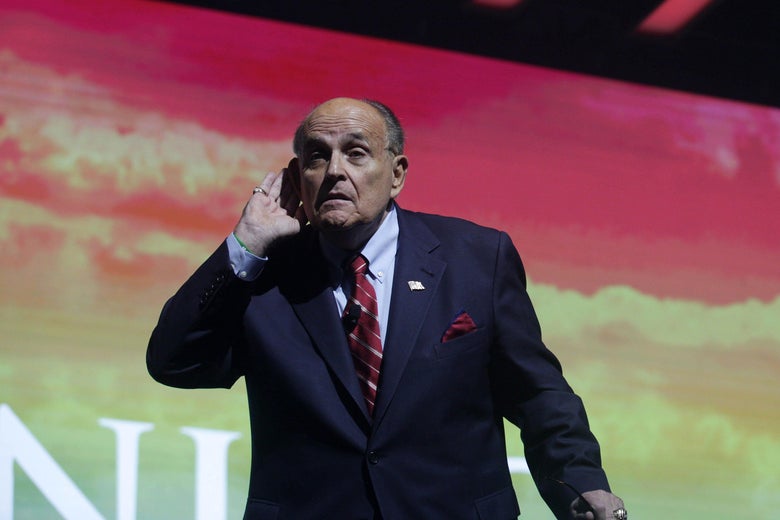
Rudy Giuliani addresses the crowd at the Turning Point USA Student Action Summit on December 19, 2019 in Palm Beach, Florida.
Saul Martinez/Getty Images
At a time when tensions between the United States and Venezuela were increasing, President Donald Trump’s personal attorney, Rudy Giuliani, took part in a phone call with the country’s president, Nicolas Maduro, reveals the Washington Post. Then-Rep. Pete Sessions of Texas was also on the September 2018 call and along with Giuliani was part of a “shadow diplomatic effort” to get socialist leader Maduro to step down as part of a plan to open the oil-rich country to private businesses again.
Why exactly was Giuliani on the call? Short answer: No one really knows. Giuliani apparently didn’t say much in the call, but his participation appears to be yet another example of how the former New York mayor has been running a shadow foreign policy operation, using his clout as the president’s lawyers to advance his private business interests. That dynamic has led to widespread concerns within the administration that he is inserting himself in foreign policy discussions and using his access to the president to build up clout for his business, all the while raising confusion about whose interests he is actually representing. Giuliani’s dual roles have been put on the spotlight during the impeachment inquiry, showing how the former mayor has expanded his lucrative foreign consulting work even as he represents the president of the United States.
When White House officials found out about Giuliani’s involvement in the call with Maduro they were confused, unsure of why exactly he would do something that appeared to go against the White House efforts to isolate the increasingly repressive Venezuelan government as the country became engulfed in an economic and social crisis. At one point, Giuliani even tried to discuss the plan to reach a deal with Maduro with John Bolton, who was then the national security adviser. Bolton, of course, immediately rejected the idea, which was hardly surprising since he has long been a hawk on Venezuela.
The phone call with Maduro was a follow-up to a visit that Sessions quietly took to Caracas to try to begin negotiations with the Venezuelan government. Sessions’ spokesman claims the visit was “coordinated with the highest levels of the U.S. State Department.” But the Post’s sources dispute that characterization, saying there was no desire in the administration to take a softer line with Maduro. “There was absolutely no interest or appetite for negotiations,” a former White House official said. “We generally did not welcome efforts like this one. It wasn’t consistent with our policy goals. We saw it as a nuisance and a distraction.”
Readers like you make our work possible. Help us continue to provide the reporting, commentary and criticism you won’t find anywhere else.
Join Slate Plusfrom Slate Magazine https://ift.tt/2MGEaRc
via IFTTT
沒有留言:
張貼留言